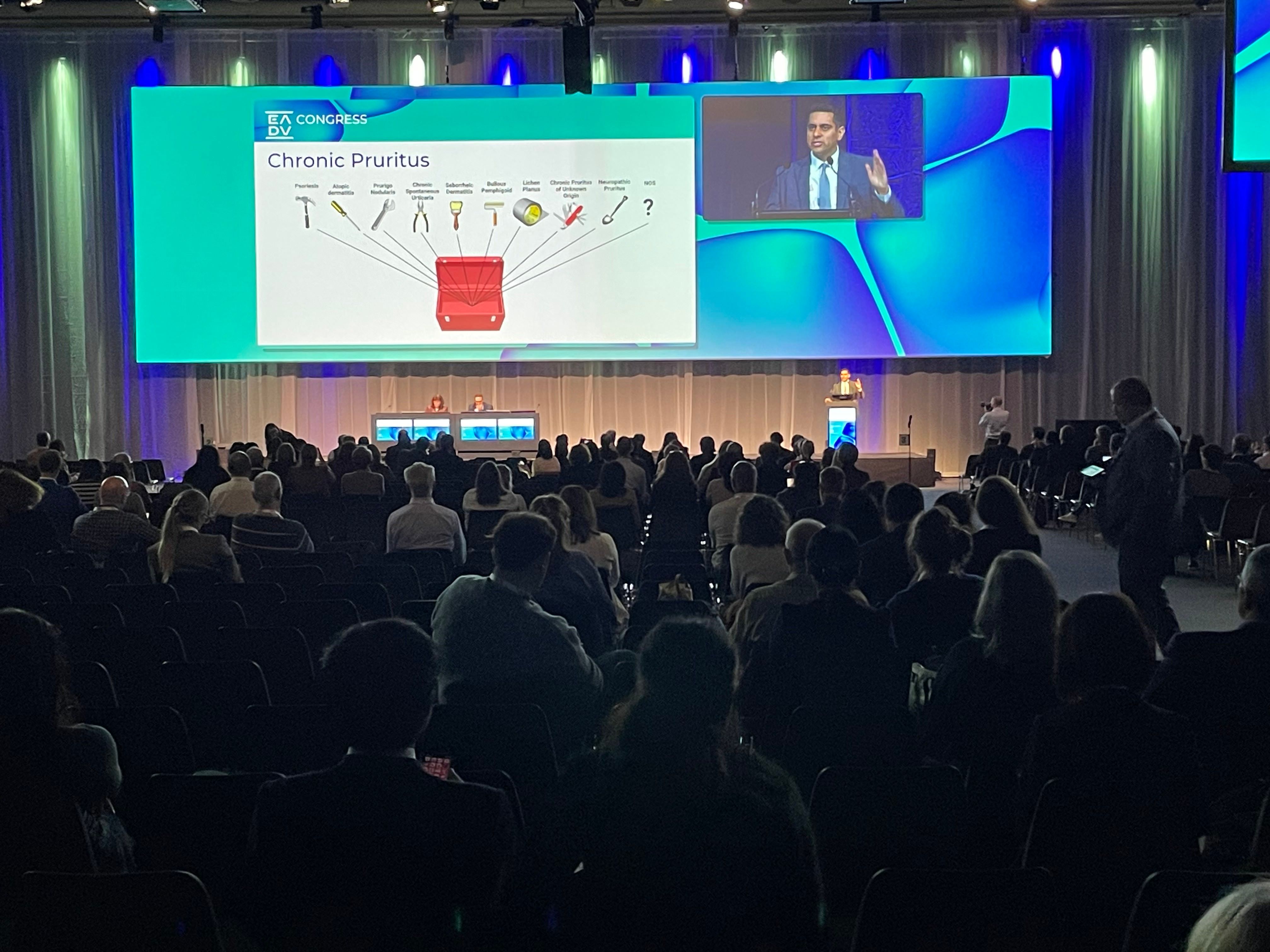- Case-Based Roundtable
- General Dermatology
- Eczema
- Chronic Hand Eczema
- Alopecia
- Aesthetics
- Vitiligo
- COVID-19
- Actinic Keratosis
- Precision Medicine and Biologics
- Rare Disease
- Wound Care
- Rosacea
- Psoriasis
- Psoriatic Arthritis
- Atopic Dermatitis
- Melasma
- NP and PA
- Skin Cancer
- Hidradenitis Suppurativa
- Drug Watch
- Pigmentary Disorders
- Acne
- Pediatric Dermatology
- Practice Management
- Prurigo Nodularis
- Buy-and-Bill
News
Article
Shawn Kwatra, MD, Reviews Late-Breaking Data of Abrocitinib for Prurigo Nodularis and Chronic Pruritus of Unknown Origin
Kwatra presented the abrocitinib data at EADV 2023.
Dr Kwatra presenting at EADV
Image courtesy of Dr Kwatra

At the European Academy of Dermatology and Venereology (EADV) Congress 2023 in Berlin, Germany, Shawn Kwatra, MD, presented new late-breaking data on the safety and efficacy of abrocitinib (Cibinqo; Pfizer) for the treatment prurigo nodularis (PN) and chronic pruritus of unknown origin (CPUO). Kwatra, associate professor of dermatology at Johns Hopkins University School of Medicine and director of the Johns Hopkins Itch Center, spoke with Dermatology Times to review his group’s investigator-initiated study findings.
In a 12-week open-label phase 2 trial, 20 patients with moderate to severe PN and CPUO were given a daily oral dose of 200 mg of abrocitinib. The primary objective was to assess the percentage change in the Peak Pruritus Numeric Rating Scale (PP-NRS) score from baseline to week 12. Secondary end points included other measures of symptom relief and quality of life, as well as transcriptomic analysis of the skin. Overall results demonstrated significant improvement in both PN and CPUO; PP-NRS scores decreased by 78.3% in PN and 53.7% in CPUO by week 12, with 80% of PN patients and 60% of CPUO patients achieving a substantial reduction in PP-NRS scores.1
Transcript
Dr Kwatra presenting at EADV
Image courtesy of Dr Kwatra

Hi, my name is Shawn Kwatra, I work at Johns Hopkins School of Medicine. I want to do a quick review of our study's presentation at the recent EADV meeting. There, we presented results on abrocitinib, which is a selective JAK1 inhibitor for the treatment of both prurigo nodularis and chronic pruritus of unknown origin. This was a unique study. It was an investigator-initiated study funded through Pfizer, but our group had complete control over the study. We submitted a proposal, got an IND through the FDA, and then we also implemented the study and presented the results all on our own. We picked prurigo nodularis and chronic pruritus of unknown origin because those conditions are orphan diseases, that at the time of designing this study, didn't have any approved options. We actually had an open label study. So, 10 PN patients and 10 CPUO patients, both cohorts of patients received the high dose abrocitinib 200 milligrams daily. And folks were treated for 12 weeks of therapy. And what we found was very rapid itch relief. So, 78.3% itch reduction in the patients who had PN from baseline to week 12 and a 53.7% reduction in patients who had chronic pruritis of unknown origin.
What was also really interesting was that many of our patients actually obtained an itch-free state, or minimal itch state, which is defined as a Peak Pruritus Numeric Rating Scale score of zero to one. At week 12, 60% of patients in both groups had that zero to one itch response. We also found very interesting data on responders versus non-responders, particularly the CPUO patients, showing that folks who responded in both groups tended to have higher blood eosinophils and IGE levels, which was actually in line with recent endotypes. Finally, there was great safety with this high dose. There were no serious treatment-emergent adverse effects or events, and the drug was very well tolerated. These studies are important because it's a way that we can get more information before large phase 3 trials are done and help reach patients that are suffering from a variety of orphan diseases.
[Transcript edited for clarity]
Reference
1. Kwatra S, Bordeaux Z, Pritchard T, et al. Efficacy, safety, and mechanism of action of abrocitinib in the treatment of prurigo nodularis and chronic pruritus of unknown origin. Presented at: European Academy of Dermatology and Venereology Congress 2023; October 11-14, 2023; Berlin, Germany.






